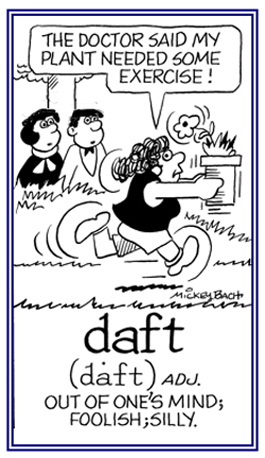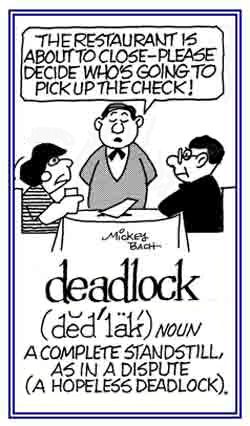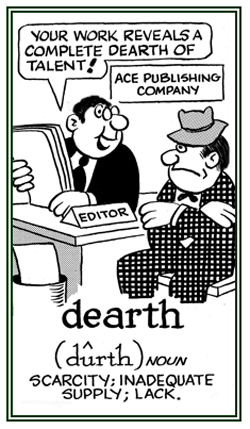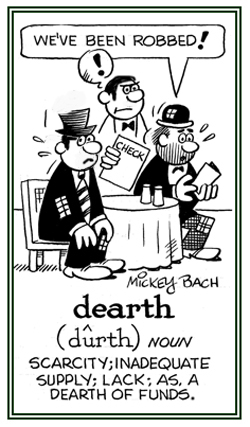English Words in Action, Group D
(a variety of English words which have developed through history and are currently used in our modern age)
Simply click on this banner (or the following link) and you will be on your way to stimulate your brain for greater word comprehension with quizzes based on some of the words in this unit.
2. A gentle touch executed quickly: Susana applied her makeup with fast dabs.
2. To play or to play around in water: Jackie was was dabbling her feet in the cool water of the swimming pool as she sat on the side dangling her feet.

Go to this Word A Day Revisited Index
so you can see more of Mickey Bach's cartoons.
The teacher told Jimmy not to answer her question with such a daft response.

Go to this Word A Day Revisited Index
so you can see more of Mickey Bach's cartoons.
2. To be astonished or amazed: Walking around the top of the new "tallest building in the world" did indeed daze the visitors.
The negotiations between the union and the company representatives reached a deadlock, or a stalemate, after hours of arguing back and forth.

Go to this Word A Day Revisited Index
so you can see more of Mickey Bach's cartoons.
2. The distribution of playing cards among players in a card game: Jack said, "Mike, it's your turn to make another deal."
3. An agreement arranged between people or groups that is meant to help each person or group: The salesman made a deal with the customer for the purchase of the new car tires.
4. An indication of how someone is treated: The supervisor was thinking about accepting a promotion with her company; however, she was offered a better deal with another organization.
2. To divide or to give among several individuals: Hans was dealing out the cards for the poker game.
3. To inflict, to give, or to deliver: The boxer dealt his opponent a blow to the jaw.
4. Buying and selling such things as drugs, art works, etc.: A girl was caught dealing drugs at the high school.
2. Lacking a sufficient supply; for example, of food that results in a famine: There is a growing dearth of rice in Asia.
3. An acute scarcity, shortage, paucity, deficiency, or an insufficient amount: There is a dearth of skilled workers in the area; especially, because there is a dearth of sufficient funds to pay them.
Since there is such a dearth of evidence, the court can't convict the accused person of the crime.
4. Etymology: from about 1250, derthe, "scarcity", abstract noun formed from the root of Old English deore, "precious, costly, dear".Originally the sense of the Middle English word was used with reference to famine, when food was scarce and costly; but the word was extended to the meaning of "scarcity of anything" from about 1330.


Go to this Word A Day Revisited Index
so you can see more of Mickey Bach's cartoons.
2. To seduce someone to participate in unacceptable activities: The scandal sheets are full of stories of efforts to debauch young people by some adults.
3. To participate in a wild get-together that may involve inappropriate, loud, and excessive behavior: The rowdy gang gathered in the local pub to debauch in celebration of winning the pennant.
4. To cause a change in the value or quality of something: The vandal debauched the delicate painting by splashing green paint all over it.
5. Etymology: from Old French, "to leave work, to be idle; to turn someone away from work; to entice away, to lead astray".
A term coined from the Latin prefix de-, "from, away from, down from, out of" + French balc, bauch, bau, "beam" and it went through the following phases of development; "to rough down or to trim timber (wood) to make a beam; then, to split, to cleave; to separate; to turn someone away from his or her work or duty; to entice away; to lead astray".

Go to this Word A Day Revisited Index
so you can see more of Mickey Bach's cartoons.
2. A reference to being lead away from excellence or virtue: Rosetta encouraged debauchedly inappropriate behavior among her friends.
3. Related to the reduction of the value, quality, or excellence of someone or something; that which is debased: The company has debauchedly produced products that are worthless.
Links to all of the groups of English words in action, Groups A to Z.
You may see the bibliographic list of sources of information for these words in action.

